
He also accused the European Commission of “protectionism” and an “anti-American” attitude.
“If Europe has its own satellite constellation then great, I think the more the better. But more broadly, I think Europe is caught a little bit between the US and China. And it’s sort of time for choosing,” he said.
The European Commission said it had “always enforced and would continue to enforce laws fairly and without discrimination to all companies operating in the EU, in full compliance with global rules.”
Shares in European satellite providers such as Eutelsat and SES soared in recent weeks despite the companies’ heavy debts, in response to the commission saying that Brussels “should fund Ukrainian [military] access to services that can be provided by EU-based commercial providers.”
Industry experts warned that despite the positivity, no single European network could yet compete with Starlink’s offering.
Carr said that European telecoms companies Nokia and Ericsson should move more of their manufacturing to the US as both face being hit with Trump’s import tariffs.
The two companies are the largest vendors of mobile network infrastructure equipment in the US. Carr said there had been a historic “mistake” in US industrial policy, which meant there was no significant American company competing in the telecom vendor market.
“I don’t love that current situation we’re in,” he said.
Carr added that he would “look at” granting the companies faster regulatory clearances on new technology if they moved to the US.
Last month, Ericsson chief executive Börje Ekholm told the FT the company would consider expanding manufacturing in the US depending on how potential tariffs affected it. The Swedish telecoms equipment maker first opened an American factory in Lewisville, Texas, in 2020.
“We’ve been ramping up [production in the US] already. Do we need bigger changes? We will have to see,” Ekholm added.
Nokia said that the US was the company’s “second home.”
“Around 90 percent of all US communications utilizes Nokia equipment at some point. We have five manufacturing sites and five R&D hubs in the US including Nokia Bell Labs,” they added.
Ericsson declined to comment.
© 2025 The Financial Times Ltd. All rights reserved. Not to be redistributed, copied, or modified in any way.

